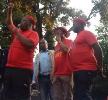CIC JULIUS MALEMA ON THE ECONOMIC FREEDOM MARCH WAY FORWARD
On the 27th of October 2015, South Africa witnessed the great Economic Freedom March, which is a protest action by all economic freedom fighters whether members of the EFF or not. We are blessed and fortunate to be at the forefront of the struggle for economic emancipation, and leading a dedicated, relentless and fearless activists, ground forces and commissars who were willing to walk for more than 27 kilometres to hoist and make demands for economic freedom.
Of course the great Economic Freedom March we led on the 27th of October 2015 is reminiscent of the Economic Freedom March we led in October 2011, despite the obvious reality that the 2015 March was qualitatively and quantitatively superior to the 2011 March.
This is an illustration that the people of South Africa are getting more conscious of the consistent message we have preached, that political power without economic power is meaningless and that South Africa should move from the Nelson Mandela era of reconciliation towards economic justice. In actual fact, the reconciliation will only be genuine reconciliation once economic justice is realized by all South Africans.
The symbolism in taking such a walk reinvents the passion we all have in the fight for economic emancipation. Never before have tens of thousands of activists took such a long journey to demand basic economic rights, and this is one journey that should be in the records of history to be celebrated by many generations to come.
The ruling party and the largely liberal and reactionary media will of course bury their heads in the sand, but the political, historical and ideological significance of the 2015 Economic Freedom March carry the same weight as the many political developments in South Africa, in particular at the beginning of the anti-pass law campaigns in 21 March 1960 and the beginning of the students' uprising in June 16 1976.
When these events happened, many commentators including the ANC led liberation movement underplayed the significance of these political events, and only realized and appreciated many years later that those political events were game changers. The 2015 Economic Freedom March is a game changer in South Africa's politics and defines the beginning of an altered relationship between capitalists (the owners of big business and land) and radical political movement, under the unapologetic and decisive leadership of the EFF.
For the first time, a political movement and the masses of our people whose aim is economic power are demanding that capitalists should make concrete commitments to the development and upliftment of all South Africans, majority of whom were oppressed and exploited to the benefit of the same capitalists.
The increasing devastation that the poor face in South Africa has placed the gains of 1994 on thin ice, facing total collapse. All the human freedoms that our constitution speak of will crumble, as the fabric of our democracy looses its gravity. Only economic freedom will reignite hope in a democratic society; only the attainment of freedom from economic exploitation and bondage will lead to a better future. The EFF is the only party that has understood this and demonstrated capability to lead us all into this future, a future of economic freedom.
Issued by EFF National Spokesperson Mbuyiseni Quintin Ndlozi, 2 November 2015

